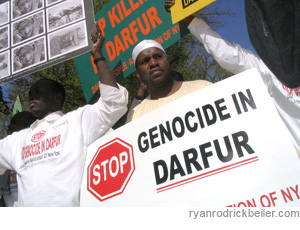 As many of us know with New Year's resolutions, the ones that will most likely lead to success are the ones that come with a detailed plan: stepping stones, goals, and -- most of all -- concrete deadlines. Every year I wistfully say something like, "I want to lose weight this year," or "I want to lower my stress level," but alas, I stay the same old me because I don't actually take concrete steps towards change.
As many of us know with New Year's resolutions, the ones that will most likely lead to success are the ones that come with a detailed plan: stepping stones, goals, and -- most of all -- concrete deadlines. Every year I wistfully say something like, "I want to lose weight this year," or "I want to lower my stress level," but alas, I stay the same old me because I don't actually take concrete steps towards change.
Here's the really bad thing: the same problem applies to the Obama Administration's current policy towards Sudan, a situation where millions of lives hang in the balance. Without any clear plan of action, the State Department can only expect to see more of the same from the murderous Khartoum regime -- the same divide-and-conquer policy of stirring up murder and rape, the same use of ethnic cleansing as a matter of national policy, and the same intentional undermining of the Comprehensive Peace Agreement, which is all that stands between Sudan and renewed civil war.
How should the U.S. respond? Ten NGOs have recently released a major policy paper entitled "Clear Benchmarks for Sudan" that outlines firm steps that the Obama Administration should implement in order to hold Khartoum accountable.
The State Department released a policy review this past October that promised to assess Sudan's progress and act accordingly. Yet we have still not seen any public disclosure from the White House of how exactly they plan on holding Sudan accountable. As Sudan faces elections this spring that threaten the country's stability, our U.S. leadership must provide Sudan with clear and public expectations.
God made us as a people who need clear guidance and stipulations. Moses publicly told the Israelites to choose between the two paths of life and death, and he clarified what consequences they could expect for each (Deuteronomy 30:11-20). Likewise, we are told clearly of our need to accept Christ as our Savior if we want to inherit eternal life (Romans 10:9). God did not merely say, "just be good, or else." Similarly, we can only expect positive change in Sudan if Khartoum clearly knows that there will be consequences for their actions, and what those consequences will be.
To learn more, scroll down to the "Take Action" section of the Enough Project's Web site.
 Melanie Weldon-Soiset is a Policy and Organizing Associate at Sojourners and a third year Master of Divinity student at Wesley Theological Seminary.
Melanie Weldon-Soiset is a Policy and Organizing Associate at Sojourners and a third year Master of Divinity student at Wesley Theological Seminary.
Got something to say about what you're reading? We value your feedback!